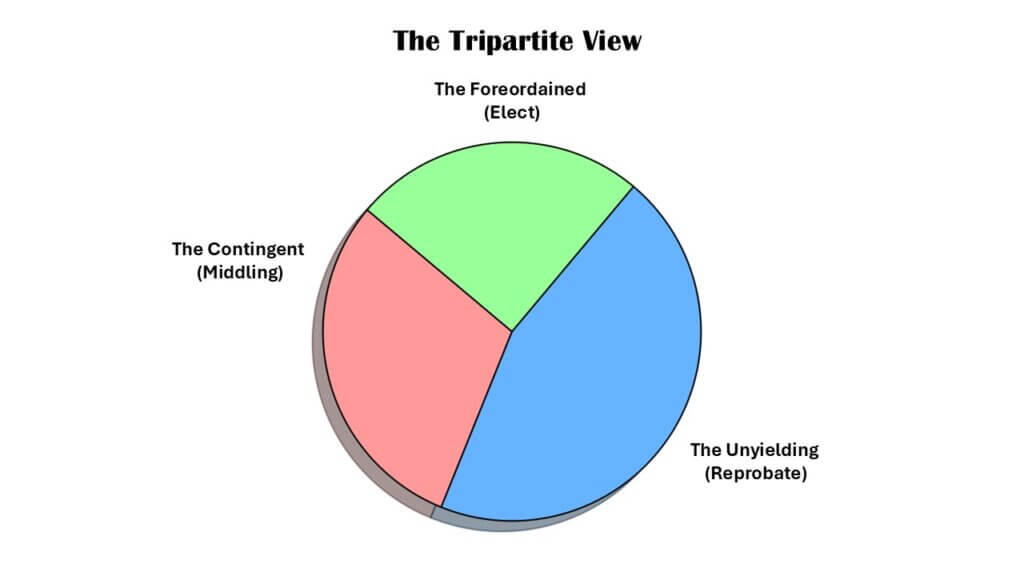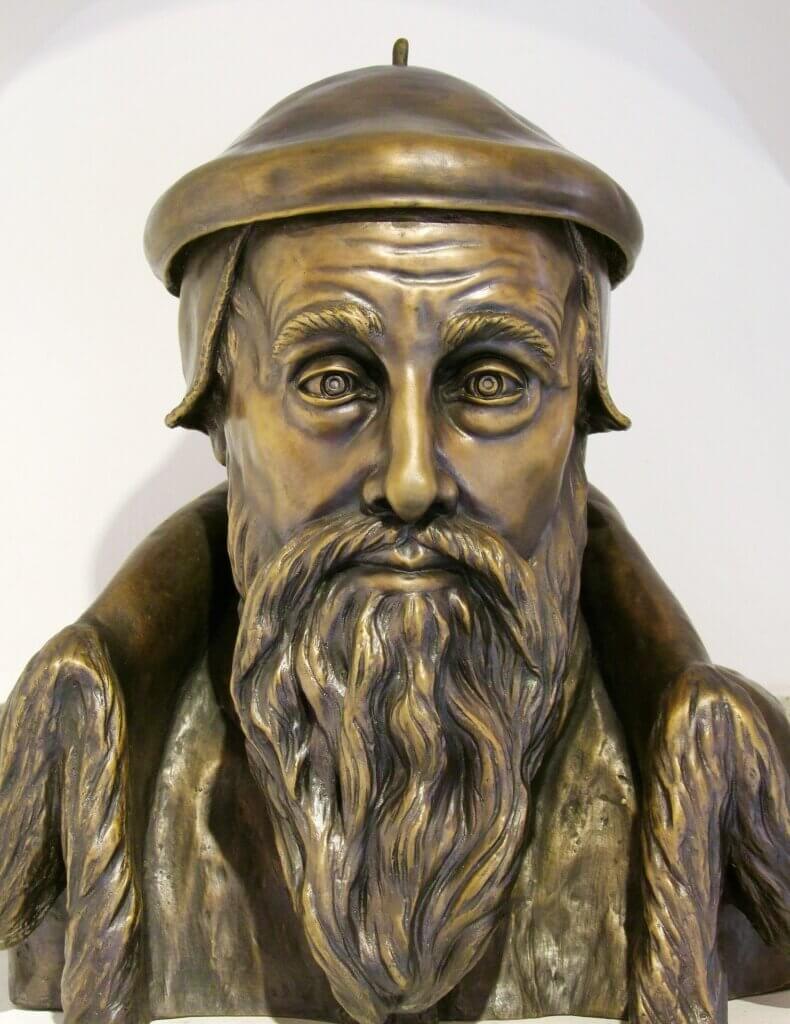What if the Bible Teaches Both Predestination and Free Will?
Scripture says divine election is conditioned “according to the foreknowledge of God” (1 Pt. 1:2):
Elect according to the foreknowledge of God the Father, through sanctification of the Spirit, unto obedience and sprinkling of the blood of Jesus Christ: Grace unto you, and peace, be multiplied. (1 Pet. 1:2 KJV)
Scripture also says divine election was not conditioned according to works either good or evil the Elect do:
For the children being not yet born, neither having done any good or evil, that the purpose of God according to election might stand, not of works, but of him that calleth. (Rom. 9:11 KJV)
The apparent contradiction has caused controversy in the Church. John Calvin cited Paul to propose Election was by Sovereign choice and not based upon foreknowledge at all, while Jacob Arminius cited Peter to propose Election is conditioned on foreknowledge of “foreseen faith”. Both assume only two classes of people exist, the Righteous and the Unrighteous. Suppose they are wrong, suppose three classes exist: “The Righeous+The Wicked+The Middling People”?
For example, everyone assumes there are only two classes of people in this context (Mt. 25:31-46)
“And these will go away into everlasting punishment, but the righteous into eternal life.” (Matt. 25:46 NKJ)
Actually, Christ points to a third called: “My Brethren”
“And the King will answer and say to them,`Assuredly, I say to you, inasmuch as you did it to one of the least of these My brethren, you did it to Me.’ (Matt. 25:40 NKJ)
Paul hints there is a “third class” of People in Romans 11:5-32, who when added to the Elect become Israel’s “fullness”:
5 Even so then, at this present time there is a remnant according to the election of grace.
6 And if by grace, then it is no longer of works; otherwise grace is no longer grace. But if it is of works, it is no longer grace; otherwise work is no longer work.
7 What then? Israel has not obtained what it seeks; but the elect have obtained it, and the rest were blinded.
8 Just as it is written: “God has given them a spirit of stupor, Eyes that they should not see And ears that they should not hear, To this very day.”
9 And David says: “Let their table become a snare and a trap, A stumbling block and a recompense to them.
10 Let their eyes be darkened, so that they do not see, and bow down their back always.”
11 I say then, have they stumbled that they should fall? Certainly not! But through their fall, to provoke them to jealousy, salvation has come to the Gentiles.
12 Now if their fall is riches for the world, and their failure riches for the Gentiles, how much more their fullness!(Rom. 11:5-12 NKJ)
In Revelation 3:15-16 Christ criticizes those who could be categorized as “middling people” who are neither cold or hot:
15 “I know your works, that you are neither cold nor hot. I could wish you were cold or hot.
16 “So then, because you are lukewarm, and neither cold nor hot, I will vomit you out of My mouth. (Rev. 3:15-16 NKJ)
James warns against being “double minded” who might not receive salvation from the LORD, something that could be said only about those whose fate is undetermined:
6 But let him ask in faith, with no doubting, for he who doubts is like a wave of the sea driven and tossed by the wind.
7 For let not that man suppose that he will receive anything from the Lord;
8 he is a double-minded man, unstable in all his ways. (Jas. 1:6-8 NKJ)
Lets assume the School of Hillel (Gamaliel, Paul the apostle Acts 22:3) is correct, that three classes of people exist on Judgment Day, which is confirmed in the book of Revelation when the “book of life” is opened so names could be written into it (Rev. 20:12) :
[I.15 A] Said R. Kruspedai said R. Yohanan, “Three books are opened [by God] on the New Year: one for the thoroughly wicked, one for the thoroughly righteous, and one for middling [people].
“The thoroughly righteous immediately are inscribed and sealed for [continued] life.
[C] “The thoroughly wicked immediately are inscribed and sealed for death.
[D] “Middling [people] are left hanging from New Year until the Day of Atonement.
[E] “If they [are found to have] merit, they are inscribed for life.
[F] “If they [are found] not [to have] merit, they are inscribed for death.”
[G] Said R. Abin, “What is the Scriptural [foundation for this]? [Ps. 69:28 states]: ‘Let them be blotted out of the book of the living. Let them not be inscribed among the righteous.’ ‘Let them be blotted out of the book’-this refers to the book of the thoroughly wicked. ‘[… of the] living’-this refers to the book of the righteous. ‘Let them not be inscribed among the righteous’-this refers to the book of middling [people].”-Neusner, J. (2011). The Babylonian Talmud: A Translation and Commentary (Vol. 6b, p. 83). Peabody, MA: Hendrickson Publishers.
Rabbi Abin relies on unstated implications: “Let them be blotted out” implies the Book of the Thoroughly Wicked because the action is ongoing, they will never repent. “Book of the Living” lists the names of the Thoroughly Righteous. “Inscribed among the righteous” implies the Book of the Middling.
If this construct of three classes is correct, then both Arminius and Calvin were partly right. Both Predestination and Free Will are taught in scripture. Its a matter of perspective, the texts that seem to contradict one of the possitions taken, actually apply to the “middling people”.
Another way we can resolve the paradox is to infer what it was God foreknew. Then the paradox vanishes. Before the foundation of the world it follows Omniscient God had two versions of Creation in view, the “Unfallen Version” which existed only in the Mind of God, and the “Fallen Version” that actually came into existence.
If God elects according to “a condition” foreknown in the “unfallen version” (which never comes into existence), Election would be according to God’s Sovereign “good purpose and will” and free of any hint of unfairness even though it is not based upon any works of good or evil the Elect do in this life.
Before God created, in His Omniscience He experiences everyone who would come into existence, some respond to His love with love, others with hate. The “children of God” and the “children of the Devil” were fully known.
God skipped over the children of the Devil. By a special act of “foreknowledge”, God “knew before” all those who loved Him like “highlighted text” is known before surrounding dark text. And God loved them even more (cp. Rom. 11:2). [2] Therefore, before they did anything good or bad God predestined those He foreknew loved Him unto salvation, regardless what their “fallen versions” do in this fallen realm.
This is not Molinism. His view depended on the existence of “Middle Knowledge”, this view is founded in God’s “Natural Knowledge” which no one objects to.
God Omnisciently knows what every unfallen individual human would do in a particular set of circumstances, where they came to into existence knowing fully God’s love for them, and His Person. Those who responded to God’s love and Person, with love —-God predestines all things will work together for their good:
And we know that all things work together for good to those who love God, to those who are the called according to His purpose. (Rom. 8:28 NKJ)
Those who are called to live with God forever, according to the purpose of enjoying life with Him for all eternity, in love and holiness, enjoying life to its fullest with God—He in them, and they in Him, are selected from among all who would ever live, and predestined unto salvation.
God will not tolerate Death or Satan have the victory over one of these He foreknew are His, therefore He predestines them unto salvation.
29 For whom He foreknew, He also predestined to be conformed to the image of His Son, that He might be the firstborn among many brethren.
30 Moreover whom He predestined, these He also called; whom He called, these He also justified; and whom He justified, these He also glorified.
31 What then shall we say to these things? If God is for us, who can be against us?
32 He who did not spare His own Son, but delivered Him up for us all, how shall He not with Him also freely give us all things?
33 Who shall bring a charge against God’s elect? It is God who justifies.
34 Who is he who condemns? It is Christ who died, and furthermore is also risen, who is even at the right hand of God, who also makes intercession for us.
35 Who shall separate us from the love of Christ? Shall tribulation, or distress, or persecution, or famine, or nakedness, or peril, or sword?
36 As it is written: “For Your sake we are killed all day long; We are accounted as sheep for the slaughter.”
37 Yet in all these things we are more than conquerors through Him who loved us.
38 For I am persuaded that neither death nor life, nor angels nor principalities nor powers, nor things present nor things to come,
39 nor height nor depth, nor any other created thing, shall be able to separate us from the love of God which is in Christ Jesus our Lord. (Rom. 8:29-39 NKJ)
Everyone else is “undetermined”, they choose in this life whether they also will live eternally with God in love.
Those who haven’t heard the gospel of Christ, will upon death, even infants are granted the intellectually ability to understand, and those who believe Jesus is the Christ, the Son of God and trust in His sacrifice to pay for their sins, will be raised to the resurrection of life, even if they hear the gospel while in Hades, the grave:
5 They will give an account to Him who is ready to judge the living and the dead.
6 For this reason the gospel was preached also to those who are dead, that they might be judged according to men in the flesh, but live according to God in the spirit. (1 Pet. 4:5-6 NKJ)
28 “Do not marvel at this; for the hour is coming in which all who are in the graves will hear His voice
29 “and come forth– those who have done good, to the resurrection of life, and those who have done evil, to the resurrection of condemnation. (Jn. 5:28-29 NKJ)
Upon death there is a judgment, the dead hear Christ’s voice and all who obey pass over from death into life, eagerly waiting for His second appearance unto salvation:
24 For Christ has not entered the holy places made with hands, which are copies of the true, but into heaven itself, now to appear in the presence of God for us;
25 not that He should offer Himself often, as the high priest enters the Most Holy Place every year with blood of another–
26 He then would have had to suffer often since the foundation of the world; but now, once at the end of the ages, He has appeared to put away sin by the sacrifice of Himself.
27 And as it is appointed for men to die once, but after this the judgment,
28 so Christ was offered once to bear the sins of many. To those who eagerly wait for Him He will appear a second time, apart from sin, for salvation. (Heb. 9:24-28 NKJ)
Predestination unto salvation is the action God took to guarantee none of His children were lost because of the Fall.
God Predestined those He foreknew would fall, unto salvation. Not based upon anything the “fallen version” were or did in this life. It was God’s good will and pleasure not to lose any of His beloved because the Fall prevented the “unfallen version” from coming into existence.
(for the children not yet being born, nor having done any good or evil, that the purpose of God according to election might stand, not of works but of Him who calls), (Rom. 9:11 NKJ)
4 just as He chose us in Him before the foundation of the world, that we should be holy and without blame before Him in love,
5 having predestined us to adoption as sons by Jesus Christ to Himself, according to the good pleasure of His will. (Eph. 1:4-5 NKJ)
8 For by grace you have been saved through faith, and that not of yourselves; it is the gift of God,
9 not of works, lest anyone should boast.
10 For we are His workmanship, created in Christ Jesus for good works, which God prepared beforehand that we should walk in them. (Eph. 2:8-10 NKJ)
Evidently it was unacceptable to God the fallen realm would corrupt so many of those He knows are His. Nor was it acceptable to refuse to create and all who would choose to love God (after He loved them first 1 Jn. 4:19) would not come into existence. Neither was tolerable.
Election unto Salvation resolved God’s dilemma. Only creatures with absolute free will, could love God freely for Who He is. If their Free Will were a farce, their “robot love” would be an abomination. Therefore, to endow free will yet permit the inevitable fall occur [or the Beloved would never exist], God had to predestine they be saved, regardless what the fall made them become.
In other words, in a fallen world few would be saved in this life. Most never hear the gospel. Many are deceived by the temptations and lies of this fallen realm and so ignore or despise what little of the gospel they heard.
Therefore, God predestines the Elect unto salvation, even if they must pass through hell first before they repent and believe in Jesus.
The torments of Hades are the “antidote” to the poison of the fall. Those torments cannot fail to bring one to their senses. Only those irrevocably set against living in God (John 17:21; Rev. 21:3, 22-23) in Holiness and light (James 1:17) will fail to repent and believe in Jesus and be saved.
But there is a penalty to pay for endowing creatures with free will. Some would choose evil. As God knew the fall was inevitable, He had to endure with much long suffering these vessels of wrath (Rom. 9:22-24).
Why didn’t God predestine everyone unto salvation? That would violate their free will. Not all in the “unfallen realm” loved God after God loved them first. Absolutely free will resulted in about a third of the angels (Rev. 12:4) choosing evil. The analogy implies a third of humanity reject God’s love also. They love evil. Forcing them into a relationship would be an evil act. Forcing them against their will, is antithetical to God’s character.
Everyone has every opportunity to choose life and join the Elect. That is required by the presence of names in the Book of Life that are not “The Elect”:
“He who overcomes shall be clothed in white garments, and I will not blot out his name from the Book of Life; but I will confess his name before My Father and before His angels. (Rev. 3:5 NKJ)
The promise is a fraud if the name cannot be blotted out from the Book of Life. Therefore, this is not spoken to the Elect whose names cannot be blotted out. Elected before they did good or bad (Rom. 9:11) their names were written “before the foundation of the world” (Rev. 13:8; 17:8; Eph. 1:4). As they are predestined unto salvation (Rom. 8:29) they overcome.
Therefore, names can exist in the Book of life that are not “Elect”, the “undetermined” could be written in or blotted out. They have free will choice and equal chance to be saved with the Elect. For example, the names of the wicked men chasing David potentially could be written in the book of life. David asks God blot their names out so that doesn’t happen:
May they be blotted out of the book of life, And may they not be recorded with the righteous. (Ps. 69:28 NAS)
An Aramaic Psalms Targum explains how some ancients understood this verse:
Give iniquity for their iniquity, and let them not be purified to enter the assembly of your righteous ones. (Ps. 69:28 PST)
The Book of Life has the names of the Elect and potentially the undetermined (who could choose to go either way). The latter are judged according to their works (Rev. 20:13,15), which determines which books their names appear in on Judgment Day.
God is “longsuffering toward us, not willing that any should perish but that all should come to repentance” (2 Pet. 3:9 NKJ). If the “undetermined” do what is right, their names won’t be blotted out from the Book of Life.
14 “And as Moses lifted up the serpent in the wilderness, even so must the Son of Man be lifted up,
15 “that whoever believes in Him should not perish but have eternal life.
16 “For God so loved the world that He gave His only begotten Son, that whoever believes in Him should not perish but have everlasting life.
17 “For God did not send His Son into the world to condemn the world, but that the world through Him might be saved.
18 “He who believes in Him is not condemned; but he who does not believe is condemned already, because he has not believed in the name of the only begotten Son of God.
19 “And this is the condemnation, that the light has come into the world, and men loved darkness rather than light, because their deeds were evil.
20 “For everyone practicing evil hates the light and does not come to the light, lest his deeds should be exposed.
21 “But he who does the truth comes to the light, that his deeds may be clearly seen, that they have been done in God.” (Jn. 3:14-21 NKJ)
11 For there is no partiality with God.
12 For as many as have sinned without law will also perish without law, and as many as have sinned in the law will be judged by the law
13 (for not the hearers of the law are just in the sight of God, but the doers of the law will be justified. (Rom. 2:11-13 NKJ)
And if you call on the Father, who without partiality judges according to each one’s work, conduct yourselves throughout the time of your stay here in fear (1 Pet. 1:17 NKJ)
Unfortunately, when Paul affirmed “there is no unrighteousness with God” (Rom. 9:14) he assumed readers accepted that premise without question. That all would discern God never subverted Pharaoh’s free will. Pharaoh hardened his own heart. God orchestrated events that enabled Pharaoh’s free will manifest itself, but never subverted it.
God hardened Pharaoh’s heart (Ex. 7:3) by permitting Satan work deceiving wonders (Ex. 7:11-13) that strengthened Pharaoh’s free will choice to resist God. No “hardening energy” went from God to Pharaoh to make him choose evil. That was entirely Pharaoh’s choice, but orchestrated events led to Pharaoh being ruler over God’s people and his choice to resist God be actualized. God did not cause Pharoah to attack God’s people, he chose to do that on his own. Compare what this verse says about a different attack:
Indeed they shall surely assemble, but not because of Me. Whoever assembles against you shall fall for your sake. (Isa. 54:15 NKJ)
If any nation comes to fight you, it is not because I sent them. Whoever attacks you will go down in defeat. (Isa. 54:15 NLT)
“Their eyes THEY have closed”
For the hearts of this people have grown dull. Their ears are hard of hearing, And their eyes they have closed, Lest they should see with their eyes and hear with their ears, Lest they should understand with their hearts and turn, So that I should heal them.’ (Matt. 13:15 NKJ)
As everything requires Sovereign God’s permission to occur, it can be said “God sends the energy of delusion”, but in context God stops restraining the energy of spiritism that is deceiving Satan’s children [like Pharoah was deceived] so they can do the evil they freely desire to do:
6 And now you know what is restraining, that he may be revealed in his own time.
7 For the mystery of lawlessness is already at work; only He who now restrains will do so until He is taken out of the way.
8 And then the lawless one will be revealed, whom the Lord will consume with the breath of His mouth and destroy with the brightness of His coming.
9 The coming of the lawless one is according to the working of Satan, with all power, signs, and lying wonders,
10 and with all unrighteous deception among those who perish, because they did not receive the love of the truth, that they might be saved.
11 And for this reason God will send them strong delusion, that they should believe the lie,
12 that they all may be condemned who did not believe the truth but had pleasure in unrighteousness. (2 Thess. 2:6-12 NKJ)
END NOTES
[1]
4268 πρόγνωσις prognosis
Meaning: 1) foreknowledge 2) forethought, pre-arrangement-Strong’s Concordance
QUESTION—What is meant by πρόγνωσιν ‘foreknowledge/predestination’?
1. It refers to what is known beforehand [LN; KJV, NAB, NIV, REB]: he chose you in accordance with what he knew beforehand. It is the personal intimacy of a loving father, not just a knowledge of facts [TNTC]. It speaks of a relationship that has its origin in God himself [NIC].-Abernathy, D. (2008). An Exegetical Summary of 1 Peter (2nd ed., p. 13). Dallas, TX: SIL International.
[2]
4267 προγινώσκω proginosko
The church has debated what the “foreknowledge” of God is since Augustine and I believe they missed Paul uses “foreknew” in Romans 8:29 in the same way he does in Romans 11:2. Perhaps they didn’t correctly quantify God’s Omniscience, He knows all things without the act of foreknowledge. He is Infinite, all spacetime is in Him, including what is future. Nothing exists apart from God, including the future.
29 For whom He foreknew (4267 προγινώσκω proginosko), He also predestined to be conformed to the image of His Son, that He might be the firstborn among many brethren. (Rom. 8:29 NKJ)
2 God has not cast away His people whom He foreknew (4267 προγινώσκω proginosko). Or do you not know what the Scripture says of Elijah, how he pleads with God against Israel, saying, (Rom. 11:2 NKJ)
The sense of “foreknew” (4267 προγινώσκω proginosko) in Romans 11:2 is found Romans 8:29, its knowing a selection of people “before others”:
Sense: to foreknow (personally) – to befriend or be acquainted with someone in a familiar way ahead of time or before meeting; implying an exclusivity of choice relative to those not befriended-Bible Sense Lexicon, Logos Bible Software
QUESTION—In what sense is the verb προγινώσκω ‘know beforehand’ used here?
… Before the foundation of the world God knew them intimately and chose them [NICNT, NTC], or loved them specially and chose them [Ho].…The knowing here has the Hebraic sense of a relationship experienced and acknowledged [WBC]. God knew and loved them beforehand [Mu, St].-Abernathy, D. (2008). An Exegetical Summary of Romans 1–8 (2nd ed., p. 560). Dallas, TX: SIL International.
Calvin’s self-contradiction proves Sherlock Holmes was a much better logician
God’s Plan for the Lost
Jesus Preached to the Dead
Elect Rise From Hell On Judgment Day?
Lazarus and the Rich Man: Can the Rich Man Repent and be Saved?
What did the apostle John reveal when he said: “It is the last hour”?The Coming False Christ and His Followers Revealed



